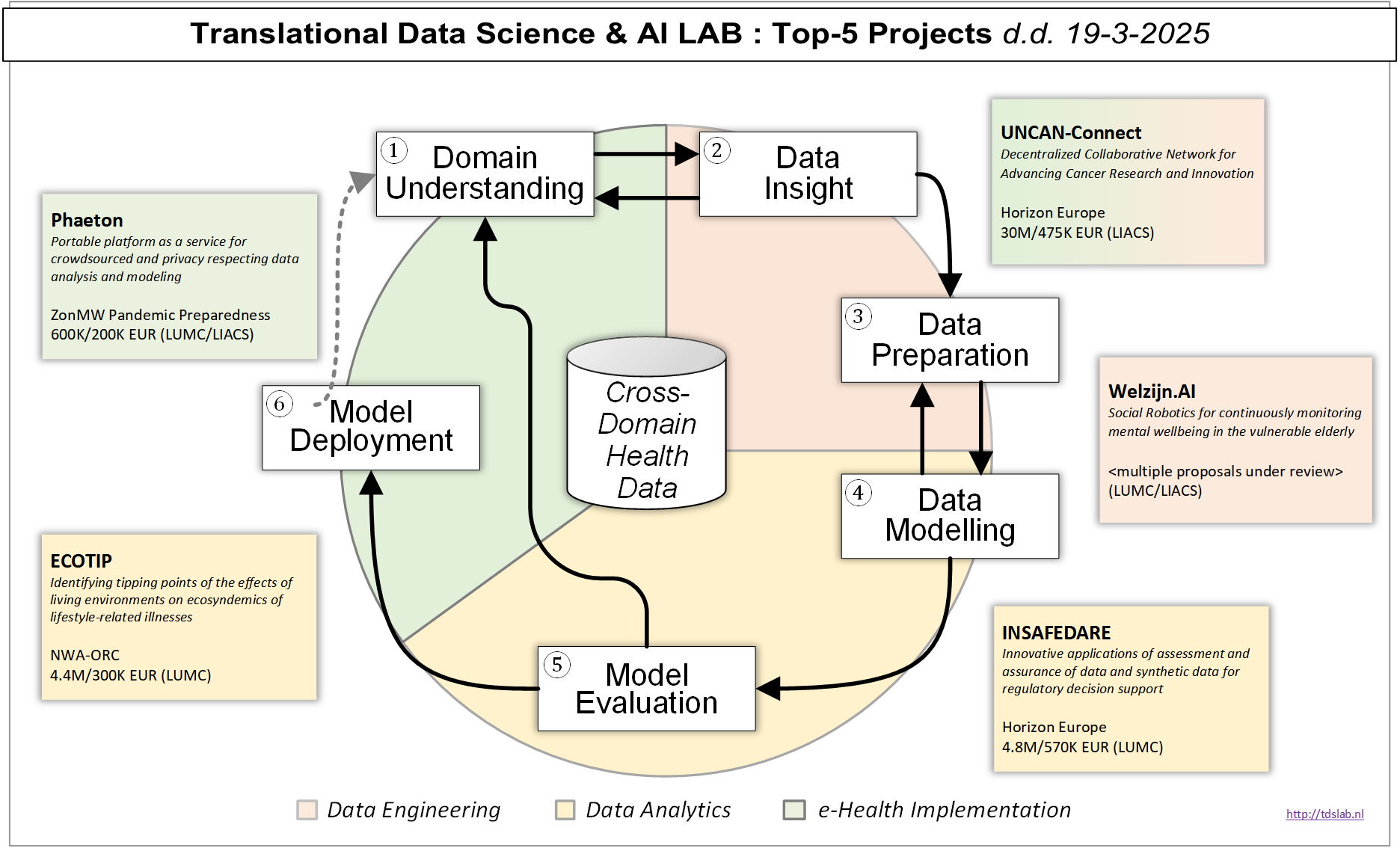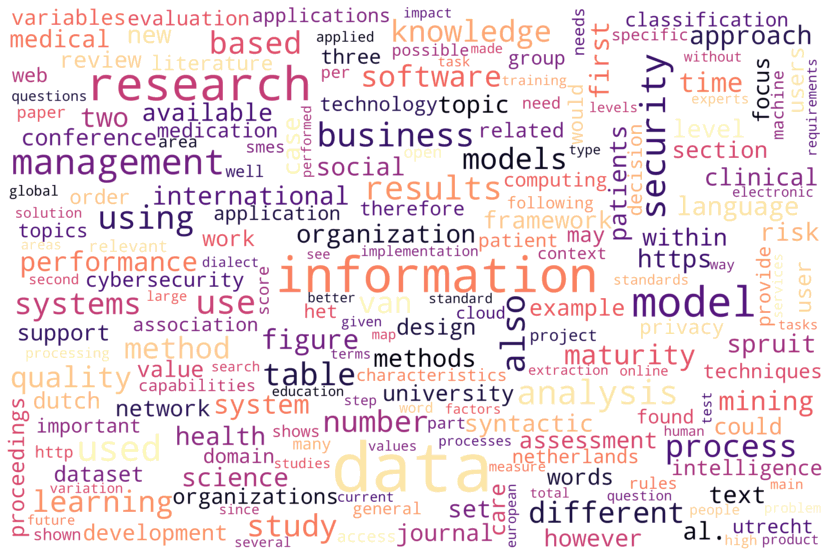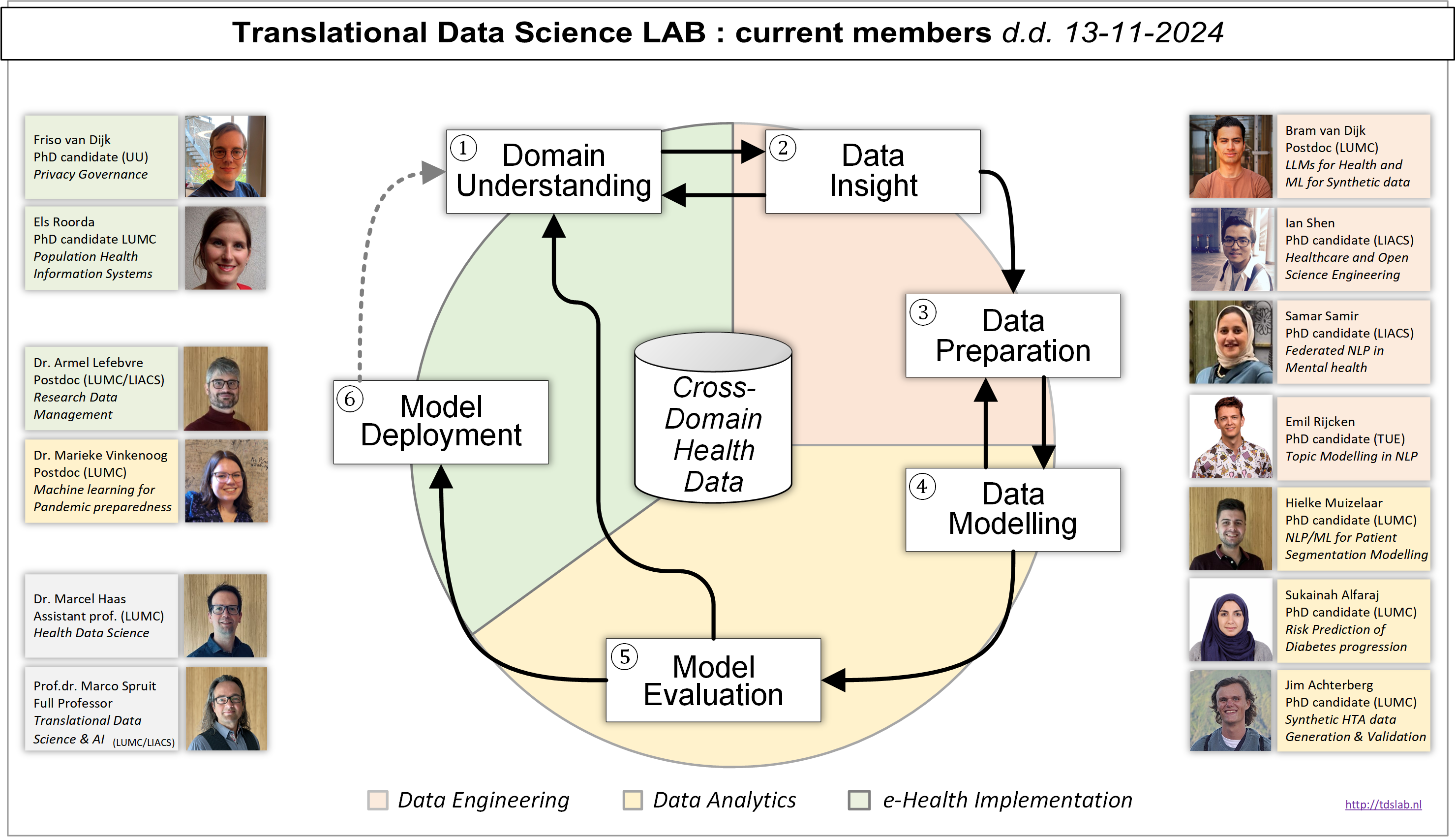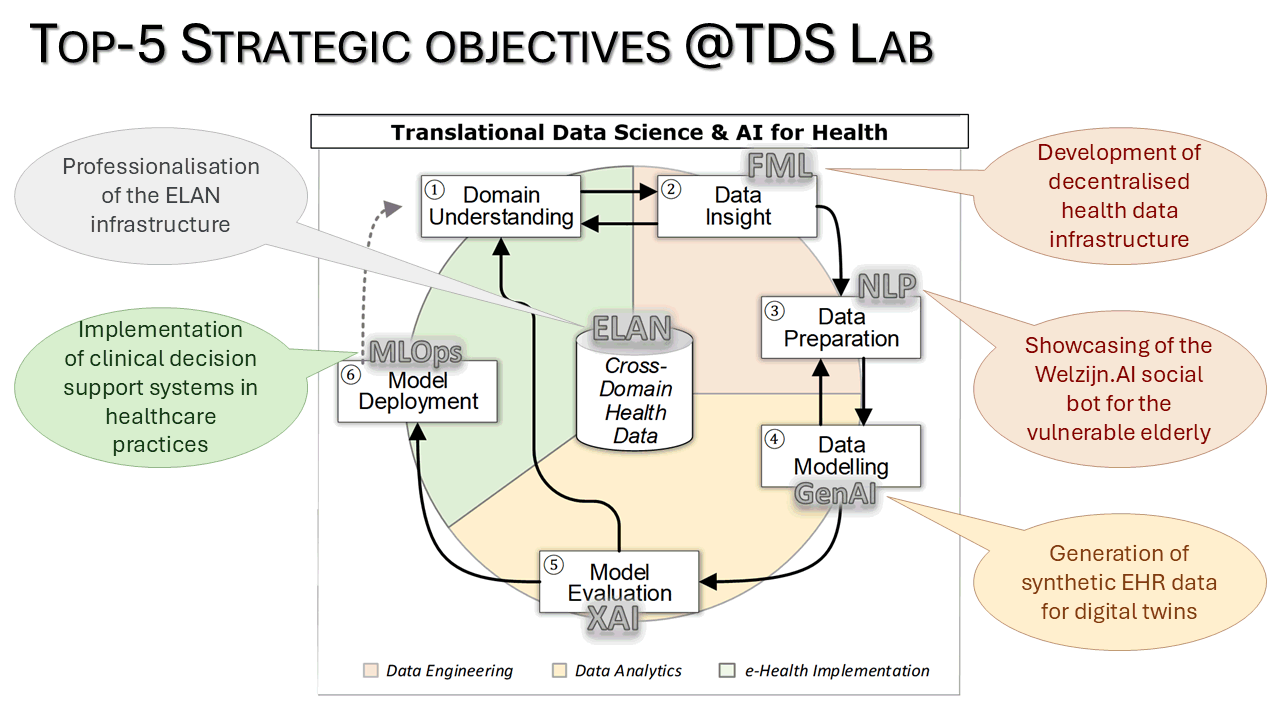
Translational Data Science & AI Laboratory

The Translational Data Science & AI Lab (a.k.a. TDS Lab)'s mission is to connect practical
problems in healthcare practices to fundamental challenges in data science and
to subsequently address both simultaneously. This is our encompassing Translational
Data Science (TDS) research theme, which bridges the best of both worlds.
We pursue a better fundamental understanding of the world around us through data science & AI innovations by being societally inspired, demand-driven and solution-oriented.
See our About page for more information.
Top-5 TDS Lab projects

Current research grants (Total: 26)
- 2026-2029: SharedGovInfra, 240K EUR (LUMC).
- Improving availability, access, and usage of socio-medical data through unified governance - for researchers, health professionals, policymakers, and citizens.
NWO/Open Science Infrastructure Call, 2024 1st round: 0.7 fte postdoc for 36 months.
Remark: grant total: 1.4M EUR. umcgresearch.org
- 2025-2029: UNCAN-Connect, 475K EUR (LIACS).
- Decentralized Collaborative Network for Advancing Cancer Research and Innovation.
HORIZON-RIA: HORIZON-MISS-2024-CANCER-01-01 (Research and Innovation actions supporting the implementation of the Mission on Cancer).
Remarks: grant total: 30M EUR, 53 partners from 19 European and associated countries, comprising 6 SMEs, 3 LEs, 42 RTOs, 3 affiliated partners, and 1 NGO.
Researcher(s): 1 PhD student, 1 postdoc. cordis.europa.eu
- 2025-2029: MULAMAQ, 300K EUR (LIACS).
- Multimodal Language Markers for Perceived Quality-of-Life Assessment.
InSPIRe 2025 (LIACS Initiative for Strategic PhD/Postdoc and Innovative Research).
Remark: grant total: 300K EUR.
Researcher(s): Ng,Y.M.
easychair.org/inspire2025
- 2024-2028: ECOTIP, EUR 130K (LUMC).
- Identifying tipping points of the effects of living environments on ecosyndemics of lifestyle-related illnesses by ML/NLP modelling of a patient segmentation model based on EHR and environmental data.
Financer(s): NWO New Science Agenda (NWA-ORC).
Applicant(s): Kiefte,J., Spruit,M., Vos,R., et al.
Remark: NWO dossier NWA.1518.22.151; grant total: 4.4M EUR.
Researcher(s): Muizelaar,H.
www.nwo.nl/en/projects/nwa151822151
- 2024-2026: Phaeton, EUR 150K (LUMC) + EUR 50K (LIACS).
- Pandemic preparedness. Portable platform as a service for crowdsourced and privacy respecting data analysis and modeling.
Financer: ZonMW Modelleren voor Pandemische Paraatheid: een oproep tot innovatie en kennisontwikkeling SA 2023.
Applicant(s): Bouwman,J., Haas,M., Spruit,M..
Remark: ZonMW dossier #10710062310030, grant total: 500K EUR.
Researcher(s): Vinkenoog,M.
universiteitleiden.nl/.../liacs-phaeton
- 2023-2026: INSAFEDARE, EUR 571K (LUMC).
- Innovative applications of assessment and assurance of data and synthetic data for regulatory decision support. Generation and evaluation of a benchmarking synthetic dataset amenable to the regulatory process, analytical methods for validation of digital health applications, and components for data integration pipelines.
Financer(s): Horizon Europe: HORIZON-HLTH-2022-TOOL-11-02: Tools and technologies for a healthy society.
Applicant(s): Despotou,G. et al.
Remark: HEU project #101095661; grant total: 4.8M EUR.
Researcher(s): Achterberg,J. & Dijk,B. van
10.3030/101095661
- 2023-2026: HealthBox, EUR 66,000 (LUMC).
- A personalized, home-based eHealth intervention to treat metabolic syndrome and prevent its complications by ML/NLP modelling of a patient segmentation model based on EHR and environmental data.
Applicant(s): Chavannes,N., Atsma,D., Pijl,H., Vos,R., et al.
Remark: grant total: 2.5M EUR.
Researcher(s): Muizelaar,H.
nwo.nl/en/projects/kich1gz0321007
Research topics wordcloud

Latest journal articles (Total: 120)
- Bianchi,N., Lefebvre,A., Wolstencroft,K., & Spruit,M. (In press). Design and evaluation of semantically-valid negative samples integration techniques for scalable semi-automated drug repurposing prediction pipelines in rare disease research. BMC Bioinformatics.
- Alfaraj,S., Vos,R., Spruit,M., Groenwold,R., & Mook-Kanamori,D. (2025). Towards Personalized Diabetes Management: Identifying Stability for Efficient Care Using Primary Care Data. Journal of Medicine, Surgery, and Public Health, 100218. 10.1016/j.glmedi.2025.100218
- Alfaraj,S., Vos,R., Spruit,M., Groenwold,R., & Mook-Kanamori,D. (2025). Insulin Initiation in Type 2 Diabetes: Unraveling the Sociodemographic and Biological Dynamics using Routinely Collected Primary Care Data. British Journal of General Practice, BJGP.2024.0693. 10.3399/bjgp.2024.0693
- Van Dijk,B., Lefebvre,A., & Spruit,M. (2025). Welzijn.AI: A Conversational AI System for Monitoring Mental Well-being and a Use Case for Responsible AI Development. Maturitas, 108616. In: The future of healthy ageing. 10.1016/j.maturitas.2025.108616
- Achterberg,J., Haas,M., Van Dijk,B., & Spruit,M. (2025). Fidelity-agnostic synthetic data generation improves utility while retaining privacy. Patterns, 101287. 10.1016/j.patter.2025.101287
- Mosteiro,P., Wang,R., Scheepers,F;, & Spruit,M. (2025). De-identification Methodologies in Dutch Medical Texts: A Replication Study of Deduce and Deidentify. Electronics, 14(8), 1636. Digital Security and Privacy Protection: Trends and Applications, 2nd Edition. 10.3390/electronics14081636
- Rijcken,E., Zervanou,K., Mosteiro,P., Scheepers,F., Spruit,M., & Kaymak,U. (2025). Machine Learning vs. Rule-Based Methods for Document Classification of Electronic Health Records within Mental Health Care - A Systematic Literature Review. Natural Language Processing Journal, 10, 100129. 10.1016/j.nlp.2025.100129
Latest conference proceedings (Total: 93)
- Khalil, S., Tawfik,N., & Spruit,M. (In press). TVFed-P: Tversky-based Federated Learning with Personalized Loss Parameterization for Medical Imbalanced Data. 3rd Workshop on Advancements in Federated Learning Technologies (WAFL) at ECML-PKDD 2025, 15 Sept 2025, Porto. [preprint]
- Van Dijk,B., Kuiper,T., Aoulad si Ahmed,S., Mooijaart,S., Duin,J., Lefebvre,A., Johnson,J., & Spruit,M. (2025). Out of the Box, into the Clinic? Evaluating State-of-the-Art ASR for Clinical Applications for Older Adults, Proceedings of the Fourth Workshop on Bridging Human-Computer Interaction and Natural Language Processing (HCI+NLP) (pp. 72-78), Conference on Empirical Methods for Natural Language Processing (EMNLP 2025), 9 Nov 2025, Suzhou, China. 10.18653/v1/2025.hcinlp-1.7
- Klaassen,W., Van Dijk,B., & Spruit,M. (2025). A Review of Challenges in Speech-based Conversational AI for Elderly Care. 35th Medical Informatics Europe (MIE) Conference 2025, Intelligent health systems - From technology to data and knowledge, 327 (pp. 858-862). 19-21 May 2025, Glasgow, Scotland. 10.3233/SHTI250481
- Leito,R., Lefebvre,A., Van Dijk,B., & Spruit,M. (2025). A natural and unobtrusive conversation using a RASA-driven chatbot for monitoring the wellbeing of elderlies. 35th Medical Informatics Europe (MIE) Conference 2025, Intelligent health systems - From technology to data and knowledge, 327 (pp. 979-983). 19-21 May 2025, Glasgow, Scotland. 10.3233/SHTI250518
- Achterberg,J., Van Dijk,B., Islam,S., Waseem,M., Gallos,P., Epiphaniou,G., Maple,C., Haas,M., & Spruit,M. (2025). The Data Sharing Paradox of Synthetic Data in Healthcare. 35th Medical Informatics Europe (MIE) Conference 2025, Intelligent health systems - From technology to data and knowledge, 327 (pp. 582-586). 19-21 May 2025, Glasgow, Scotland. 10.3233/SHTI250404
TDS Team

TDS Objectives

Recent #tdslab News on Mastodon





